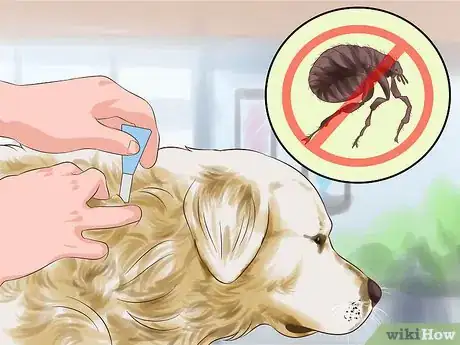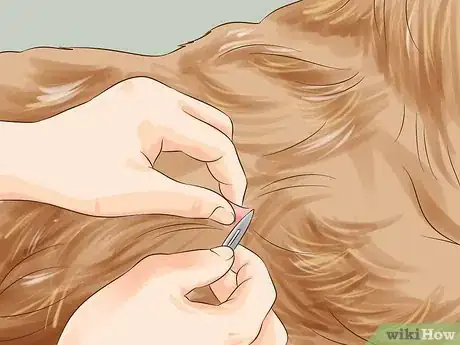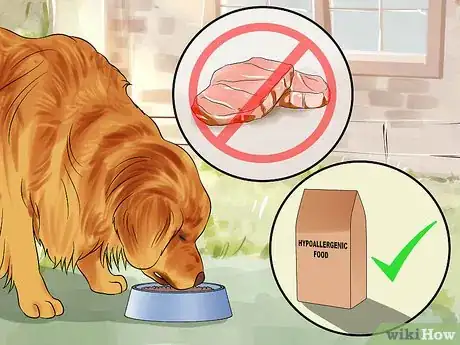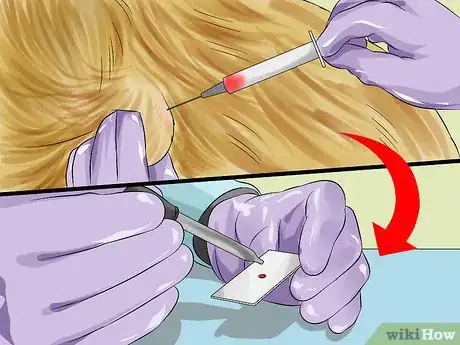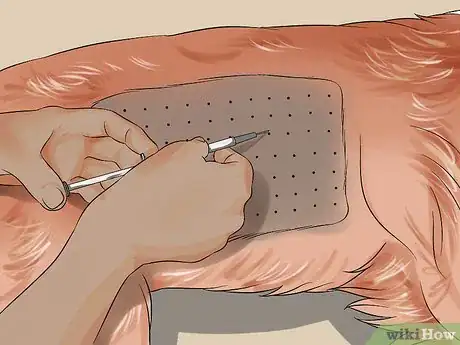This article was co-authored by April Power. April Power is a Dog Breeder and the Owner of Power Goldendoodles in Boise Idaho. She places her puppies all around the United States, specializing in breeding English Teddybear Goldendoodle puppies. In June 2020, We Love Doodles named Power Goldendoodles as one of the 9 Best Goldendoodle breeders who sell in California.
There are 10 references cited in this article, which can be found at the bottom of the page.
This article has been viewed 31,467 times.
Does your Golden Retriever seem to be itchier than usual? Is his skin starting to look damaged from his scratching? He may have a skin allergy (often called Canine Atopic Dermatitis, or CAD), but other things can cause itchiness too, like flea allergy dermatitis and mange. To know for sure, he will need to be diagnosed by your veterinarian—a process that can be complex, expensive, and time consuming.[1] Do not get discouraged, though—the sooner your veterinarian can diagnose your dog’s skin allergy, the quicker your dog can start receiving relief from the itching.
Steps
Recognizing the Clinical Signs of a Skin Allergy
-
1Watch your Golden Retriever’s behavior. CAD is common in certain breeds, particularly Golden Retrievers. The telltale sign of skin allergies is itching, which can range from mild to severe. It can be localized to certain parts of your dog’s body, or spread all over.[2] The itching is caused by an exaggerated immune response: mast cells (part of the immune system) become activated and release a substance called histamine that causes your dog’s skin to itch.[3]
- If the itching is severe, your dog might eat, sleep, or play less because he feels so miserable.
- Other than scratching to relieve the itch, your dog will rub, lick, chew and bite different parts of his body (e.g., face, armpits, feet).
- Skin allergies can sometimes lead to ear infections, so your dog might start shaking his head because his ears feel itchy. This head shaking can lead to the development of a hematoma (large mass of blood) on his ear.
- Clinical signs of skin allergies usually start appearing when a dog is 6 months to 3 years old.[4]
-
2Look at your Golden Retriever’s skin. The more your Golden Retriever scratches, the more damaged his skin will become. Most noticeably, his skin will become very red. His skin may also develop hyperpigmentation, and become crusty.[5] In addition, his skin may become dry or oily.[6]
- His skin may also start developing scales.
- The scratching can lead to secondary bacterial or yeast infections on the skin, which would make the skin smell bad.
- Small red dots, called macules, can form on your dog’s skin because of all of the scratching.[7]
Advertisement -
3Observe your Golden Retriever’s overall appearance. Your dog’s skin won’t be the only body part affected by a skin allergy. For example, you may see reddening and hair loss around his eyes and muzzle. You may also notice his ears looking red. His fur will likely have patches of hair loss where he has been scratching.
-
4Record when your Golden Retriever is itchy. CAD is either seasonal or non-seasonal. If your dog seems to be particularly itchy in the late summer or fall, he may have a seasonal skin allergy due to pollen or other air allergens. If he has year-round itchiness, he probably has developed a skin allergy to something inside your home, like dust mites. Knowing when your dog becomes extra itchy will help your veterinarian diagnose the skin allergy.
Excluding Other Causes of Itchiness
-
1Treat your Golden Retriever for flea allergy dermatitis (FAD). CAD is a diagnosis of exclusion, meaning that other causes of itchiness must be ruled out before CAD can be diagnosed.[8] CAD is the second most common canine skin problem behind FAD, so your veterinarian will probably want to rule out FAD first.
- Treatments for FAD include medicated flea and tick shampoos, flea and tick sprays, and topical flea preventatives. Use the spray in a well-ventilated area.[9]
- Use these products according to the product label instructions, as well as your veterinarian’s instructions.
- You can also get rid of fleas by vacuuming your home more frequently and washing your dog’s bedding hot water.
- If your dog is still miserable and itchy after being treated for fleas, then FAD can be ruled out.
- Interestingly, fleas can trigger development of CAD.[10]
-
2Test your Golden Retriever for mange. After ruling out FAD, your veterinarian will test for other skin parasites called mites: demodex, which causes demodectic mange, and Sarcoptic scabei, which causes sarcoptic mange (scabies). He or she will take a superficial skin scraping to check for mites under the microscope.[11]
- If your veterinarian does not see mites in the skin scraping, he or she will likely rule out mange.
- Even if no mites are present, the skin scraping may reveal bacteria or yeast, indicating a secondary skin infection caused by the scratching. Your veterinarian will treat your dog for these infections.
-
3Conduct a food elimination trial. Food allergies can make your dog feel itchy. After the external parasites have been ruled out, your veterinarian will want to rule out food allergies. Proteins are a common trigger for food allergies in dogs, so your veterinarian will recommend switching your dog to a hypoallergenic food that contains a protein he has not been eaten before (e.g., duck, kangaroo).
- A food elimination trial involves feeding your dog only the new food for 8 to 12 weeks to see if his allergy symptoms go away, then re-challenging him with his old food to see if the symptoms come back.[12]
- If your dog’s itchiness persists throughout the food elimination trial, your veterinarian will likely rule out a food allergy.
- Hypoallergenic foods are available through your veterinarian.
Performing Additional Diagnostic Tests
-
1Analyze a blood sample. In addition to ruling out other skin issues, your veterinarian may want to perform advanced diagnostics to determine what's causing the skin allergy. After drawing a blood sample, your veterinarian will send it to a diagnostic lab that will screen it for antibodies to different antigens (a substance causing an allergic response), such as pollen or dust mites. Unfortunately, blood tests can sometimes produce false positive results, meaning the test indicates your dog is allergic to something that he is really not.[13]
- Blood testing is not as accurate as intradermal skin testing. Also, results can take up to 2 weeks.[14]
-
2Perform intradermal skin testing. For intradermal skin testing, your veterinarian will inject small amounts of various allergens into your dog’s skin and watch for a skin reaction. First, he or she will shave a postcard-sized patch of your dog’s fur and make several rows of dots on the skin with a pen or marker. These dots will be where your veterinarian injects the allergens.[15]
- Your dog will be sedated for the procedure.[16]
- After the injection, your veterinarian will monitor the skin reaction for 15 to 20 minutes and grade it according to the redness and size of the injection site. Swelling at the injection site indicates a possible allergy.
- Intradermal skin testing is more accurate than blood testing, but false results can occur for a number of reasons, including bacterial or fungal contamination of the allergen, too little antigen injected, and poor injection technique.
-
3Take a skin biopsy. Your veterinarian may want to take a skin biopsy to diagnose your Golden Retriever’s skin allergy. A skin biopsy is an invasive procedure, so your dog would need to be anesthetized. With all of the other diagnostic options available, it is not very likely your veterinarian will recommend a skin biopsy.
Expert Q&A
-
QuestionHow do I know if my golden retriever has allergies?
 April PowerApril Power is a Dog Breeder and the Owner of Power Goldendoodles in Boise Idaho. She places her puppies all around the United States, specializing in breeding English Teddybear Goldendoodle puppies. In June 2020, We Love Doodles named Power Goldendoodles as one of the 9 Best Goldendoodle breeders who sell in California.
April PowerApril Power is a Dog Breeder and the Owner of Power Goldendoodles in Boise Idaho. She places her puppies all around the United States, specializing in breeding English Teddybear Goldendoodle puppies. In June 2020, We Love Doodles named Power Goldendoodles as one of the 9 Best Goldendoodle breeders who sell in California.
Dog Breeder If your dog is itching and flaking, know that it might not be an allergy. Your dog may have a genetic defect common in Golden Retrievers called ICC. The vet can genetically test it with a swab through a genetic company if they suspect it.
If your dog is itching and flaking, know that it might not be an allergy. Your dog may have a genetic defect common in Golden Retrievers called ICC. The vet can genetically test it with a swab through a genetic company if they suspect it.
Warnings
- Blood tests and intradermal skin testing can each cost several hundred dollars.⧼thumbs_response⧽
- CAD is a hereditary disease. If your Golden Retriever has CAD, you should not breed him.⧼thumbs_response⧽
- Your dog’s allergic responses can get worse over time. In addition, he may develop allergies to different substances as he gets older.[19]⧼thumbs_response⧽
References
- ↑ http://www.ufaw.org.uk/dogs/golden-retriever-canine-atopic-dermatitis
- ↑ http://www.ufaw.org.uk/dogs/golden-retriever-canine-atopic-dermatitis
- ↑ http://www.animalmedcenter.com/faqs/category/canine-allergic-dermatitis-causes-and-treatment-options
- ↑ http://www.nevetdermatology.com/canine-atopic-dermatitis-treatment/
- ↑ http://www.nevetdermatology.com/canine-atopic-dermatitis-treatment/
- ↑ http://www.animalmedcenter.com/faqs/category/canine-allergic-dermatitis-causes-and-treatment-options
- ↑ https://www.merckvetmanual.com/integumentary-system/atopic-dermatitis/canine-atopic-dermatitis
- ↑ http://www.nevetdermatology.com/canine-atopic-dermatitis-treatment/
- ↑ http://www.drsfostersmith.com/pic/article.cfm?aid=60
- ↑ http://www.nevetdermatology.com/canine-atopic-dermatitis-treatment/
- ↑ http://www.nevetdermatology.com/canine-atopic-dermatitis-treatment/
- ↑ http://www.vcahospitals.com/main/pet-health-information/article/animal-health/allergy-general-in-dogs/428
- ↑ http://www.peteducation.com/article.cfm?c=2+2111&aid=504
- ↑ http://www.vet.bc.ca/allergies-skin.pml
- ↑ http://www.peteducation.com/article.cfm?c=2+2111&aid=504
- ↑ http://aadconline.com/content/skin-testing
- ↑ http://www.animalmedcenter.com/faqs/category/canine-allergic-dermatitis-causes-and-treatment-options
- ↑ http://www.animalmedcenter.com/faqs/category/canine-allergic-dermatitis-causes-and-treatment-options
- ↑ http://www.peteducation.com/article.cfm?c=2+2111&aid=503
About This Article
To diagnose skin allergies in golden retrievers, watch for mild to severe itching in localized areas or all over its body. Your dog may scratch, rub, lick, or bite the area excessively for relief. Next, inspect its skin closely for redness, hyperpigmentation, or a crusty or oily appearance. You may also see reddening and hair loss around the eyes, ears, and muzzle. If you notice these symptoms, take your dog to a vet to confirm the diagnosis and go over treatment options. For more tips from our Veterinary co-author, like how to treat flea allergy dermatitis, read on!




